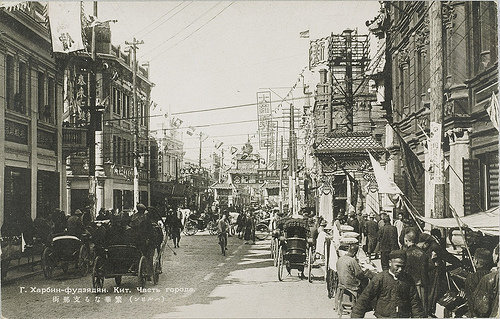At the age of eight, Olga Provatoroff left her birthplace, Harbin, in Manchuria in north-east China, for parts unknown, in the company of her mother Valentina and her maternal grandmother Anna, or ‘Babusya.’ The year was 1953. She left far behind all she had ever known: her home with its cherry orchard and her swing, the family’s much-loved Victrola, her dolls, tin tea set and the green table and chair made for her for her first birthday now abandoned forever, as were her ballet and music lessons, her friends, her cathedral, her paternal grandparents—and the father whom she had never met. She remembers holding the hand of ‘Deda,’ her paternal grandfather, and sensing his uneasiness at her departure. At the railway station with its icon of St. Nicholas, the family prayed their last molieben or brief service of intercession before boarding the train.
“S Bogom,” said Deda, “Go with God,” a phrase so like the French ‘Adieu,’ and just as final.

City of Harbin in 1930 (image from Wikipedia)
Harbin was built by Russians at the turn of the previous century. The city was a staging-point on the Chinese Eastern Railway, a branch line of the famous Trans-Siberian Railway, and acted as a shortcut through Chinese territory, connecting Chita in Siberia with the Russian port of Vladivostok on the Pacific. Harbin was then an affluent cosmopolitan city known as the ‘Paris of the East,’ home to a multiplicity of nationalities from the tsarist Russian Empire, and to a sizeable Jewish population as well. Transplanted Russian emigres administered the railway with the tacit support of the Chinese authorities in Manchuria, and co-existed peacefully in what was then a permitted Russian sphere of influence. The city boasted Russian Orthodox churches and monasteries, Jewish synagogues, international schools, libraries, theatres, cafes and parks, and even a symphony orchestra, in which Olga’s Uncle Yura had been a violinist before he emigrated to America.
But the peace and security of the community was not to last. In 1905, Russia had endured a humiliating defeat at the hands of the Japanese in the Russo-Japanese War. This calamity exposed for all to see, and for revolutionaries in European Russia to seek to exploit, fundamental weaknesses in the huge landlocked empire ruled by the Romanov dynasty. In 1917, Bolshevik insurgents with German connivance seized control of St. Petersburg, murdered the tsar and his family, and proclaimed the advent of a godless Communist tyranny in what was to become the Soviet Union. Large numbers of White Russians opposed to the new regime fled to Harbin, where, it was suspected, they would receive a friendly reception from Russian emigres loyal to the monarchy.
Japan then occupied Manchuria in 1932, and set up a puppet state known as ‘Manchukuo,’ which was to exist until Japan’s defeat in 1945. Into the vacuum left by the departing Japanese invaders, and in the face of the continuing weakness of Chinese authority, Stalinist Soviet forces then invaded Manchuria and occupied it. ‘Comrade’ Stalin was notorious for a brutality born of a paranoid fear of ‘enemies’ real or imagined. As indicated above, he deliberately starved millions of Ukrainians suspected of hoarding grain during the Holodomor of 1933. Throughout his reign of terror, suspected “mistrusted dissidents” were summarily shot or imprisoned without trial and banished to the gulags in Siberia, often merely on the strength of anonymous denunciations made to the police. And on August 31, 1945, a month after Olga’s birth, her father Yevgeni, a medical doctor like his own father, Olga’s beloved Deda, was charged under Article 58 of the Russian Soviet Federated Socialist Republic (RSFSR) Penal Code, with ‘anti-Soviet agitation,’ and ‘collaborating with the Japanese.’ He was sent away to a Siberian gulag camp for enemies of the state. In The Gulag Archipelago, its author, the great Alexander Solzhenitsyn, who spoke from bitter personal experience of such punishment, wrote “In all truth, there is no step, thought, action, or lack of action under the heavens which could not be punished by the heavy hand of Article 58.” We must assume this was yet another massive miscarriage of justice, and that Dr. Yevgeni Gerasimovich Provatoroff was innocent of any wrongdoing. Nevertheless, he was sentenced to nine years’ imprisonment. Olga was not to meet her father, for the first and only time, until 44 years later, in Moscow, when the circle of her wanderings was finally closed, and her identity made fully known to her.





Nina Gorky3 years ago
Today I typed Olga Provatoroff into a Google Search. Imagine my surprise when I saw this recent story. Olga and I were friends at the University of Toronto and the last time I saw her was at her wedding. If you can please give her my email address and tell her that I would like to talk to her.
Nina Gorky
Peter Scotchmer3 years ago
Hi, Nina, How wonderful that you will be able to connect with each other through Story Quilt. I will contact Olga and let her know you are anxious to talk to her after so many years. This is not the first time I have been able to help re-establish contact like this via Story Quilt. Make sure you read Part 2 of Closing the Circle, published Sept.1st, 2021.
(https://www.story-quilt.com/closing-the-circle-part-2/)
Good luck!
Peter Scotchmer